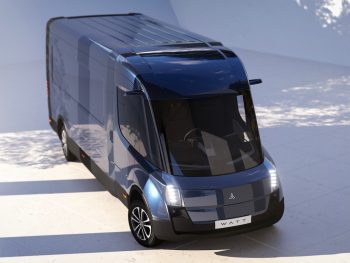UK startup Watt Electric Vehicle Company (WEVC) has revealed a production-ready of its upcoming eCV1 electric van, complete with a new wide body.

The Cornwall-based business, which also develops EVs for third parties, initially revealed the van in prototype form at the 2023 CV Show. The latest version incorporates feedback from fleets and the firm is planning to start volume production from 2026.
The new wide body is designed to give fleets the attributes of a Luton conversion – the largest type of van which can be driven in the UK with a standard licence – but with the low access height of an air suspension vehicle, in a more aerodynamic and efficient integrated body.
Features carried over from the initial concept include the central driving position, allowing a safer kerbside exit for the operator, whichever side of the road the vehicle is driving or parked on. This also delivers class-leading driver visibility, according to the business, enhancing safe operation in towns and cities.
The cabin can be configured as a walk-through two-seater or without a sliding bulkhead door and offset three abreast seating.
WEVC also says the eCV1 delivers class-leading payload and range in the 3.5- and 4.25-tonne segments.
Neil Yates, CEO, commented: “We live and breathe customer-centric engineering and have listened carefully to the fleet buyers of many large organisations regarding their electric van requirements, incorporating crucial feedback into this revised, production-ready version of the original eCV1 prototype.
“This isn’t an ‘either/or’ vehicle, it is an ‘and/and’ electric LCV, offering the operator and driver more. We can give our customers the low access height of an air suspension vehicle, with the load capacity of a Luton conversion and class-leading payload at 3.5 tonnes.
“This means many of our customers can operate the vehicle without having to go to a 4.25-tonne plated vehicle and the tachograph and 56mph speed limiter that brings with it. If they do have heavy payload requirements, we can offer them a 4.25-tonne version, which can carry up to a 1,750kg payload. No other electric van on the UK market today can offer this combination of range, payload, flexibility, visibility and ease of operation.”
The eCV1 is the first of a multi-vehicle offering planned from WEVC and uses the company’s inhouse PACES architecture, designed as a sophisticated yet cost-effective modular electric vehicle platform.
It’s developed to support commercial vehicle manufacturers, specialist vehicle converters and fleet operators in the transition to an electric future, PACES complies with ISO regulations and exceeds stringent European Small Series Type Approval safety standards.
The ‘module-to-chassis’ system means batteries are integrated to the primary structure – rather than having a separate battery pack – optimising stiffness, minimising weight, and maximising payload.
WEVC says the “clean sheet” design means the eCV1 has none of the structural, weight and packaging compromises inherent in most electric LCV designs, many of which having been converted from diesel drivetrains and which are further constrained by traditional high-volume manufacturing processes.
WEVC will continue its durability testing programme for the eCV1 and start production in 2026.

